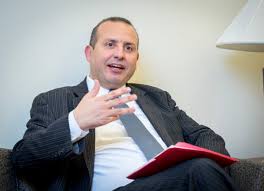The International Monetary Fund has canvassed the need for the Nigerian Government to prioritise structural reforms and growth-friendly fiscal consolidation in view of the increasing non-oil revenue accruals in order to stabilize the nation’s economy.
The IMF Senior resident representative in Nigeria, Dr Amine Mati, made this position known at the September breakfast edition of the Nigeria-South Africa chamber of commerce in Lagos.
Mati, who was the guest speaker at the event, in his presentation titled ‘Nigeria: From Fragile to Stable Growth’ tasked the government to broaden the fiscal space, increase priority expenditures and reduce its interest to revenue ratio to about 30 percent.
Specifically, the IMF chief noted that government should focus on four key critical measures in the area of non-oil sector revenue mobilization.
He listed the areas to include tax administration measures to double compliance rate to at least 50 percent; Value Added Tax reforms; rationalizing tax exemptions and incentives; and significantly scale up social and investment spending.
In addition, Mati also identified other key steps that must be taken by Nigeria, to achieve a stable economic system as maintaining a tight monetary policy; achieving a unified exchange rate; and attaining an enhanced banking sector resilience.
On the downside risks to the economy, the IMF representative said that lower oil prices; tighter external market conditions; policy implementation delays; and fragility of the banking sector constituted areas requiring serious actions of government to manage.
Elaborating further while reviewing current policy reforms of the Nigerian government, Mati noted the potential positive implications of the current reforms in the area of doing business in the country.
He, however, hinted that the October, 2018 World Bank Doing Business report would reflect in details the impact of the ongoing reforms of the Federal Government, adding that the implementation of the Economic Recovery and Growth Plan (ERGP) holds a lot of potential in driving the nation’s economic growth.






